Incheon announces its Comprehensive Development Plan for Northern Incheon to help turn Incheon into a first-class city
On November 10, Incheon Metropolitan City announced its “Comprehensive Development Plan for Northern Incheon,” which outlines the first steps toward transforming Incheon into a world-class city, at the Auditorium inside the Seo-gu Office.
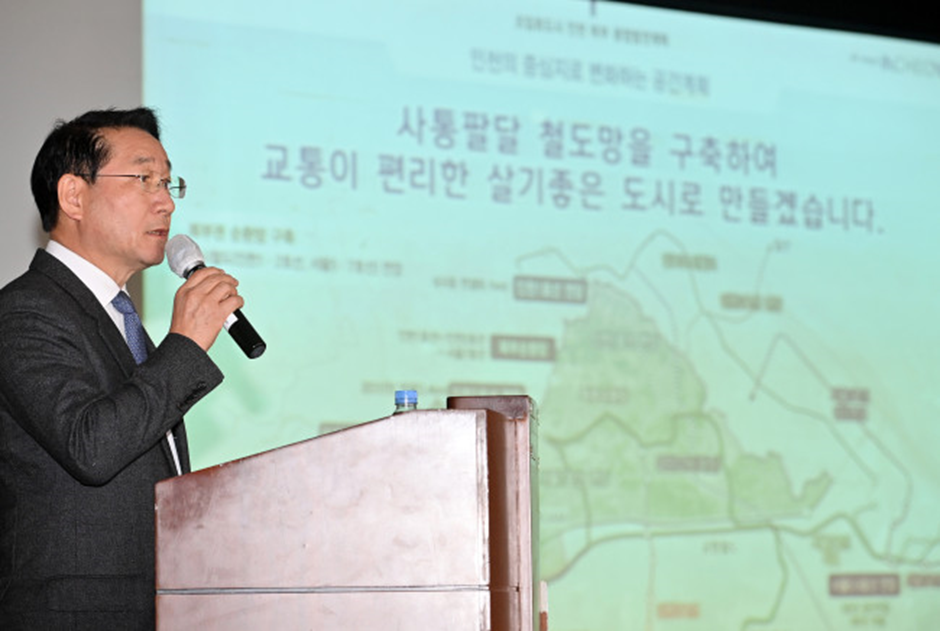
▲ On November 10, Incheon Metropolitan City announced its “Comprehensive Development Plan for Northern Incheon,” which outlines the first steps toward transforming Incheon into a world-class city, at the Auditorium inside the Seo-gu Office.
The City Administration appears to be focusing on “change and innovation” given the drastic changes in terms of policy direction and administrative systems brought on by the 8thdemocratically elected government of Incheon. The “Comprehensive Development Plan for Northern Incheon” reorganizes master plans for the Gyeyang-gu andSeo-gu districts in Incheon that lie north of Ara Canal (previously, the plan was titled the “Comprehensive Development Plan for the Northern Districts”).
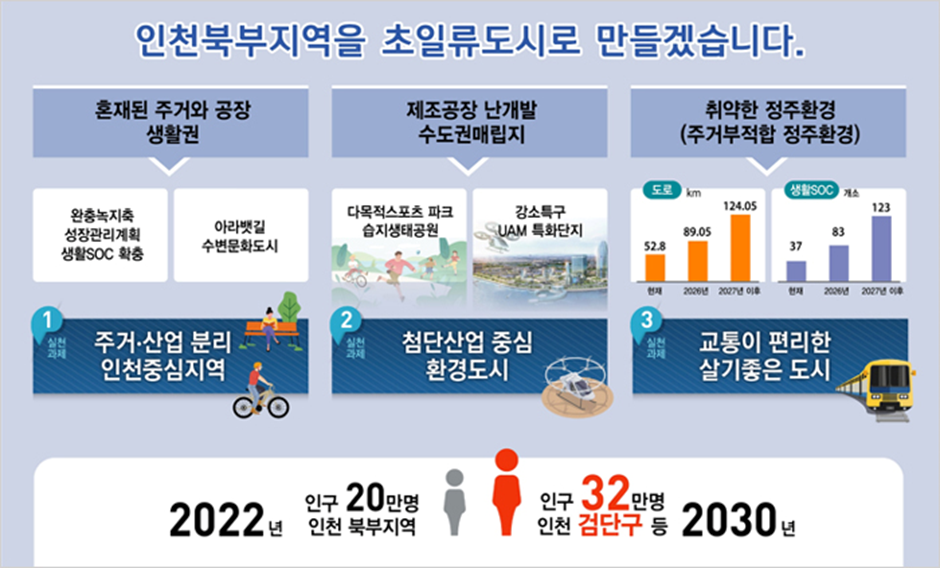
▲ Provisions from the “Comprehensive Development Plan for the Northern Districts.”
The “Comprehensive Development Plan for the Northern Districts” was planned by the 6th democratically elected administration of Inchon, and specific development plans were commissioned in April 2019, which was during the 7th democratically elected administration. However, the project was suspended this March with just 28 days remaining on its docket.
Meanwhile, the new“Comprehensive Development Plan for Northern Incheon” focuses more on the spatial planning of northern Incheon, its SOC supply plans, future development of landfills, and on improving the transportation network to make the northern districts of Incheon a better place to live. The new plan also hopes to connect the northern districts, previously considered as being cut off due to the Ara Waterway, with significant waterfront infrastructure to offer its local residents.
More specifically, to draw a clear line between residential areas and industrial areas, Incheon will build a green belt that connects Gahyeonsan Mountain, the local neighborhood park, and wildflower colony. Then, the City Administration is hoping to work with the only drone certification center in Korea currently under construction in Incheon City to build the first-ever UAM testing site on the top of the Metropolitan Area Landfill no. 2. By taking up the mantle as the leader in the UAM industry, Incheon will look to attract new businesses and growth industries that can help propel the city into the future.
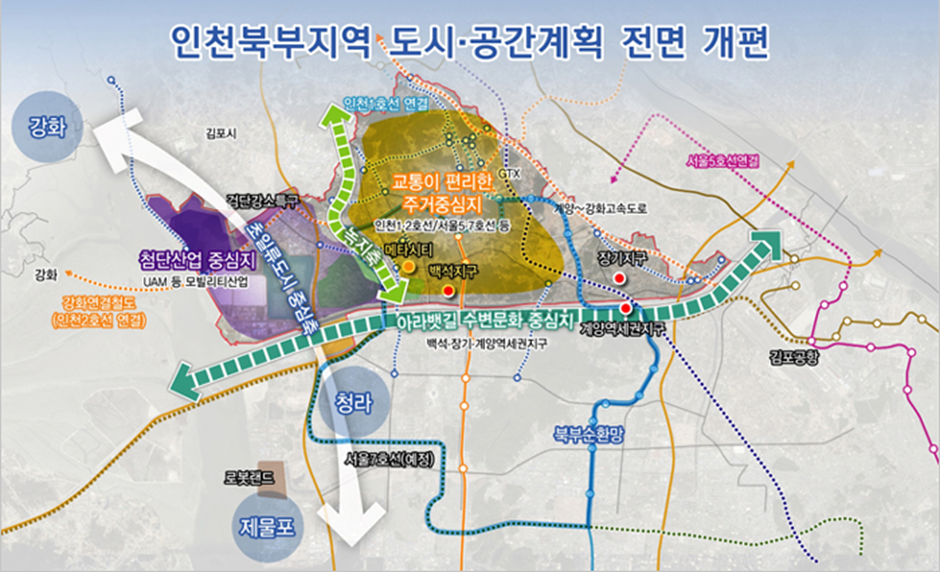
▲ Incheon is planning a full overhaul of its urban and spatial plans for the northern districts.
Moreover, Incheon will designate a new “Special Free Drone Zone” and create an environment where UAM and its adjacent industries in Korea can come together to create a cluster along the Ara Waterway. In terms of SOC supply, Incheon plans to build 46 schools, libraries, sports centers, etc. by 2026, and add 40 more in the future. These SOCs will be built in line with the Geomdan New Town and Urban Development projects, and serve as part of Incheon’s efforts to consolidate its public offices.
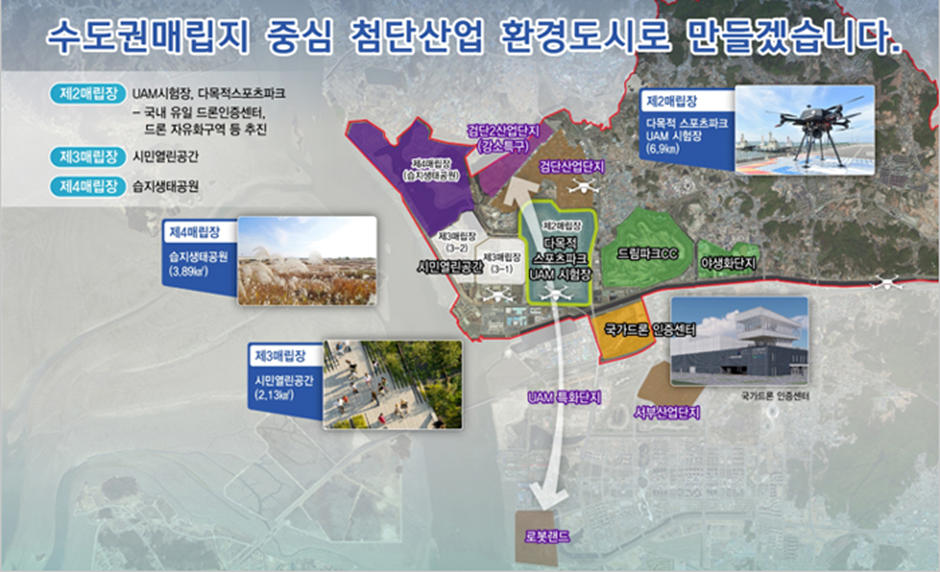
▲ The Metropolitan Area Landfill no. 2 will feature the only drone certification center and Free Drone Zone drone in Korea, whereas Landfill no. 3 will become an open space for local residents, and Landfill no. will turn into a wetland ecological park.
Moreover, to help Geomdan-gu get on its feet as an administrative district following the recent reorganization of administrative districts across Incheon, plans are being developed to establish an “administrative town,” which includes the Geomdan-gu Office building.
Once the Metropolitan Area Landfills are full, Incheon will lead their transformation as resources for the local area, and the City Administration also has plans to develop the entire area surrounding Sawol Village, which has long been a tricky issue for Incheon, into an “Eco Meta City” for the future. Landfill no. 2 will become a “UAM testing ground” and “multi-purpose sports park,” whereas Landfill no. 3 is expected to become an “open space for local residents” created in collaboration with locals, and Landfill no. 4 will become a “wetland ecological park” that takes advantage of its location adjacent to the Yellow Sea. With these plans now in place, Incheon is hoping to create a foundation to utilize the landfill sites and set its own policy direction on how it wants to transform the above-ground areas of the City.
In addition, the City will build a circulating transportation network through the northern districts using an urban railway network to integrate it with the southern districts of Incheon, and finish the Jungbong Daero road to help alleviate traffic congestion. This northern circular network will connect Incheon’s subway systems using the Incheon subway line no. 1, Incheon subway line no. 2, and the Seoul subway line no. 7.
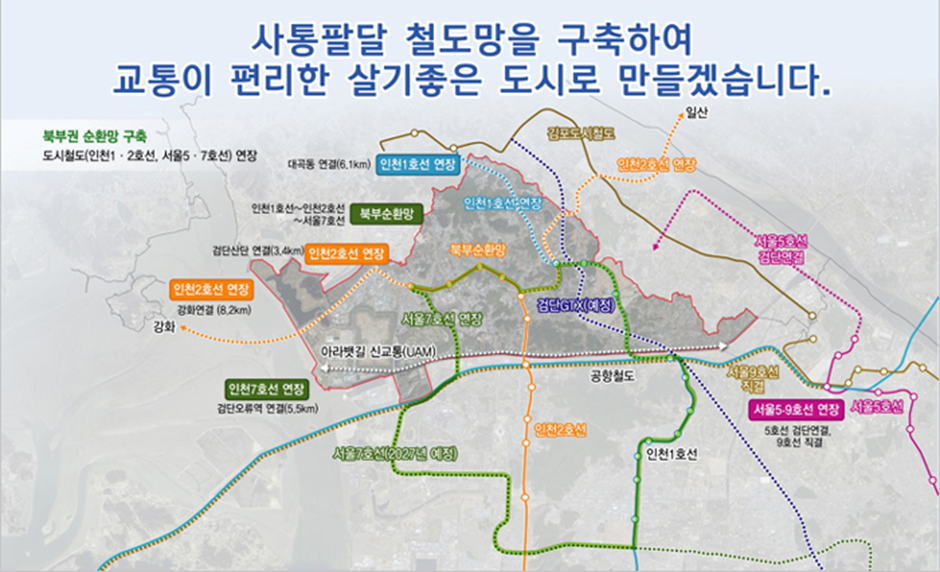
▲ The northern districts of Incheon are expected to become a much better place to live with convenient transportation thanks to a public transportation network that spreads out inall directions.
Incheon subway line no. 1proposed could extend all the way to Daegok-dong, Seo-gu, and transfer to the Gimpo Metro line, while Incheon subway line no. 2 could reach the Geomdan Industrial Complex via the Geomdan Oryu Station, and potentially reach Ganghwado in the future. Furthermore, Incheon subway line no. 3 will connect Geomdan (Seo-gu), Cheongna, Jung-gu, and Dong-gu (Jemulpo).
Seoul subway line no. 7will connect the extended Cheongna line with Incheon subway line no. 2 via the Geomdan Oryu Station to form a northern circular subway network. It will also allow for transfers with Incheon subway line no 2 as part of a major SOC of New Hong Kong City connecting Ganghwa to the Metropolitan Area Landfill and Cheongna.
This new plan will require a total budget of KRW 1 billion between 2023 to 2025 to review the feasibility of the project as part of a study commissioned for the urban railway network construction plan.
Incheon Metropolitan City plans to promote the “Comprehensive Development Plan for Northern Incheon” as its flagship policy plan, so that its content can be reflected in legal plans such as the City’s urban master plan and the urban railway network construction plan going forward.